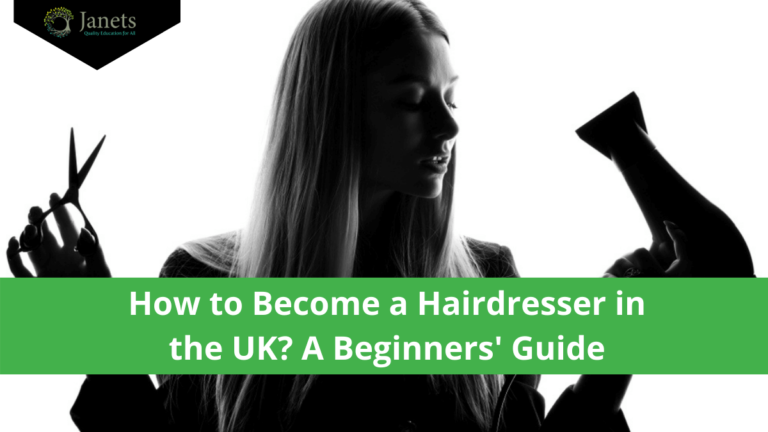Hairdressing is a very promising profession in today’s world. With all the emerging hair products, treatment and hairstyling options, hairdressers are in high demand. This article will give you a broad idea about this exciting profession and also provide a step by step beginners’ guide on how to become a hairdresser in the UK.
Who is a Hairdresser?
Hairdressers make our hair look fabulous! They are experienced with different hair cuts and styling techniques. Moreover, a hairdresser will suggest different hairstyles or cuts according to your face structure.
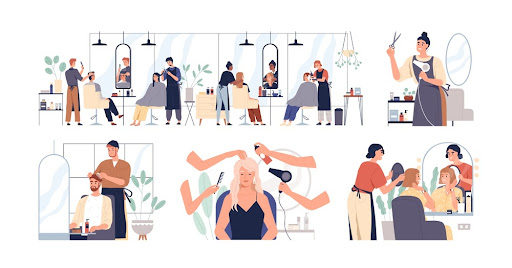
In addition, this profession brings in a lot of incentives and opportunities. If you can develop a good client base, you can earn immense popularity in your area of operation. Who knows, you might even get to style some celebrities too! Apart from this, there are many opportunities for a hairdresser in the UK. You can work at any hair salon or beauty parlour.
Or, you can even work as a contractor or own your hair salon! Most experienced hairdressers or hairstylists open up their salons after building a good client base. Also, there is no gender stereotyping or racial imbalance in this profession. So, anyone can become a hairdresser if it is their passion!
Required Skills of a Hairdresser
A hairdresser requires an excellent set of skills to outshine others in this profession. So let us look at the top three skills to help you further on how to become a hairdresser in the UK.
1. Problem-Solving Skills
As a hairdresser, you will encounter many issues with hair colour products and other pieces of equipment. You will also need to deal with customer dissatisfaction. So, for all of this, having problem-solving skills is a must.
2. Interpersonal Skills
Meeting new people, helping them daily is a must in this profession. Thus, you have to be a good communicator. You need to have a good balance of verbal and non-verbal communication skills.
Additionally, making people feel comfortable and relaxed is a must too. At the same time, you need to bring in positive energy and enthusiasm consistently. To do all these, a correct balance of all interpersonal skills are necessary.
3. Scent or Chemical Tolerance
This skill is a must. It is because most of the hair and beauty products have a strong smell from the chemicals. Therefore, an individual who is very sensitive to allergies and odours would not be a right fit for this profession.
Responsibilities of a Hairdresser
The responsibilities of a hairdresser don’t limit to just one or two. Usually, they have a large pool of skill sets. So, before getting in-depth on how to become a hairdresser, let us first find out their responsibilities.
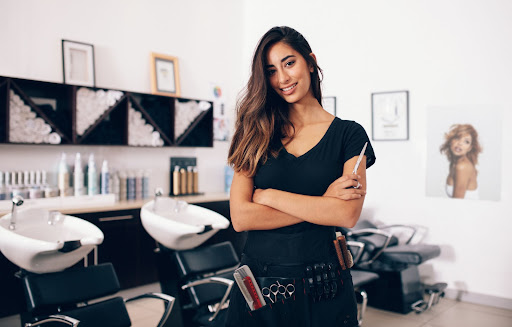
Styling and Hairdressing
This is probably the most critical responsibility of a professional hairdresser. It is one of the most glamorous parts too. It involves acting as a hair consultant because you will give your clients your professional advice. For example, if your client is sharing their hair problems, you need to give proper guidance for a cure. You could also share about the common hair problems.
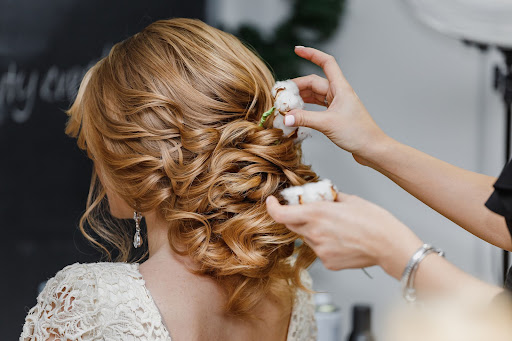
Thus, suggesting diets to get rid of hair issues is also a part of your daily job routine. Because very often your clients may ask you, “What do I apply in my hair to get rid of hair fall?”, “Which haircut would go with my face” or “Which food is good for my improving hair volume?” Therefore, you have to be an efficient idea to answer such questions.
Although to be efficient in this role, you need always to research new hair trends. You need to know about the latest trends and modern technologies for hair treatment or styling. Some other responsibilities in this segment include the following:
Hair Treatments
Salon hair treatments are the ultimate option to get healthy and beautiful looking hair. Several treatments are available to make your hair shiny, reduce hair fall and get healthier looking hair. Thus, as a professional hairdresser, you need to be a pro in all types of hair treatments available.
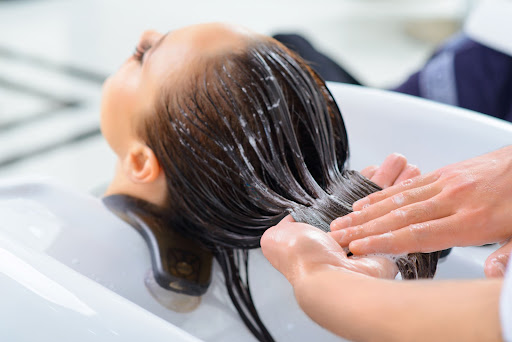
But, in the meantime, we have also done a bit of research for you too. We found three of the most highly demanding hair treatments that clients’ in the UK most go for.
1. Keratin Treatment
This is the most popular hair treatment that everyone goes for, who faces frizzy hair issues. Keratin is a protein. It is mainly found in our hair and nails. It makes the hair smoother and shinier. This treatment can even make your curly or wavy hair into a nice straight one. It can last for weeks after the treatment. But, as soon as the new hair grows out, you will have to go back to the salon and get it done again.
2. Hot Oil Treatment
This treatment provides an instant shine to your hair. It seals the hair cuticles and leaves smooth and nourished hair. The hot oil is left in your hair for about 15-20 minutes and then gets rinsed out. It also gives you some relaxation due to the message. If your hair is too dry or coloured, this treatment can do wonders for you.
3. Scalp Treatment
Our beautiful and luscious hair may hide our hair scalp, but it is indeed the root of the hair. Therefore, if you want healthy-looking hair, scalp treatment is a must! Thus, it is essential to have a proper balance of nutrients to support the hair. This treatment involves using different solutions to help you get rid of itchy hair, thin hair or even dandruff.
Hair Colouring
Who doesn’t love a stylish hair colour? There are so many glamorous hair colour trends these days that it is too hard to resist. As a hairdresser, you need to stay updated on all the hair colour trends and suggest your clients according to their face shape or complexion. You need to also fully equip your salon with all the different hair colour products.

However, there is one thing that you need to keep in mind too, and that is safety and allergy. Some clients may be allergic to ammonia or hydrogen peroxide. You should also mix a safe quantity of bleach to the hair colour.
Customer Service
Last but not least is customer service! It is the latest in our list of responsibilities before we explain how to become a hairdresser. To begin with, the mantra behind any successful business is good customer service. Making your customers feel welcomed and comfortable will take your business to its peak. Because customers can either make or break a business.
Thus, greeting their property and giving as much information is the first step. But then, you need to answer all their questions with a smiling face and build that trust.
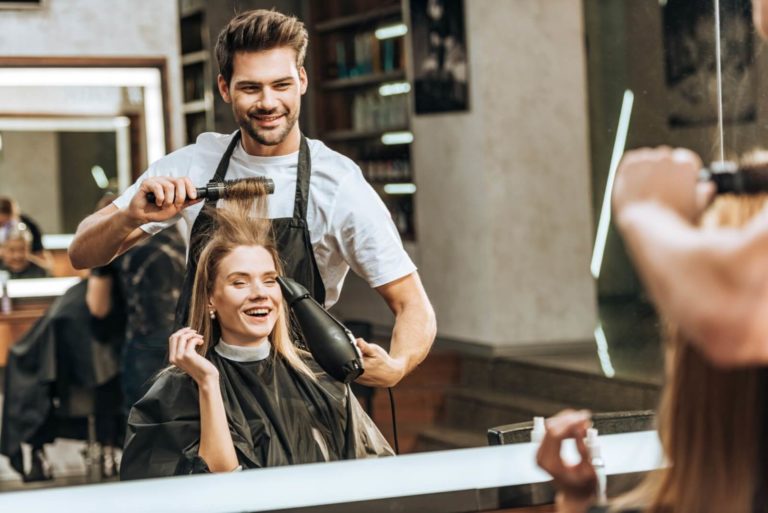
You need to confer with your clients to understand which hairdressing service they need or looking for. Similarly, you should understand each client’s demands regarding hair and skin problems. Then attempt to advise solutions for them. You should also give them correct information about the processes and timeframes for different treatments.
Moreover, even though you are the best hairdresser in the town but have poor customer service skills, then there are high chances that your business will not flourish. No customer would want a grumpy person to touch their hair! You will get fewer referrals and poor reviews on Google or your website. Therefore, poor customer service is a big NO in this hairdressing business.
How to Become a Hairdresser?
We have now built a strong understanding of whom a hairdresser is and their primary job responsibilities. Thus, now let us explore all the options available to become a hairdresser in the UK. This profession might look very easy to others, but it takes a lot of effort and accuracy to become a successful hairdresser in the UK.
Especially when the competition levels are too high, every suburb in London has more than three hairdressers. So, amid so much competition, you need to be able to give your best shot and get proper accreditation and experience before starting your professional career.
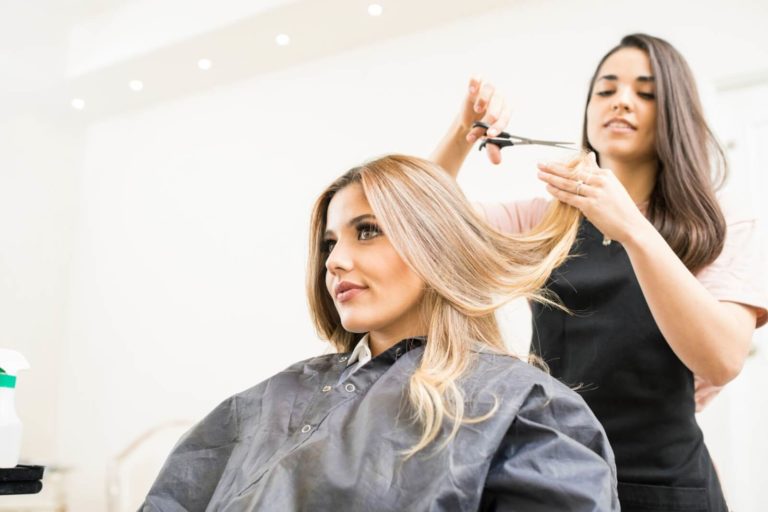
So, without further ado, let us look at the options on how to become a hairdresser in the UK.
College Education
An accredited college degree plays an essential role in giving you the correct breakthrough to your professional career. It acts as a ladder to help you accomplish your dreams. In addition, a college degree will teach you the basics of hairdressing and the essential skills required to be in this field.

However, colleges have some entry requirements too. Some general entry requirements include:
However, there are several types of qualifications that you can consider becoming a professional hairdresser in the UK. These courses are based on hairdressing or barbering and can be both full-time or part-time. So, there are certificates, diplomas and even degree level qualifications that you can consider.
Vocational Qualifications
National Vocational Qualification (NVQ) is the standard accreditation in the UK. It must be gained at level 2 or 3 to be recognised as an accomplished and skilled hairdresser. The tests are both theoretical and practical in NVQ. Therefore, to pass, you should be able to showcase your practical hairdressing skills in an exam setting.
Moreover, level 3 qualifications are more precise than level 2. This is because they cover specific hairdressing techniques, including hair styling, colouring, cutting, and other creative skills.
Diplomas
There are many Diplomas in hairdressing, barbering or any other related fields in the UK. Diplomas are generally more theory-based than practical. They require both coursework and written examinations. Also, they are recognised by the UCAS tariff. So they can be used as an alternative to A-levels to gain entry into universities.
In addition, a Diploma in Hairdressing would teach you all the required soft skills and technical skills for this profession. The diplomas are designed so that you learn all the hairdressing skills and get trained in safety, rules, and regulations related to this profession.
At Janets, all our hairdressing are run by talented professionals in this industry, and the courses are fully accredited and CPD certified. Some other hairdressing courses that you can also consider includes- Hairdressing and Hair braiding, Hair Cutting and Hairdressing and Hairdressing and Barbering.
Degree Programs
Although foundation degree and degree courses are not essential, they can be highly beneficial if you plan on running your salon. You can get enrolled in an undergraduate program in hairdressing at any reputed university. This is because they cover specific sub-topics in such extensive detail.
For instance, you can even get to learn how to style celebrities hair in your course. You can also learn a lot from topics like business and entrepreneurship. You will get to think like an entrepreneur and know marketing strategies to boost your business sale.
Apprenticeship
Apprenticeship provides you with job training. You work under the full supervision of a professional hairdresser. Since you already get exposed to the work environment, you tend to develop confidence and skills. You can start working for a hair salon and perform any duties. Even if you just shampoo or dry hair, it is also a part of your apprenticeship training. One best part about apprenticeships is you earn as you learn!
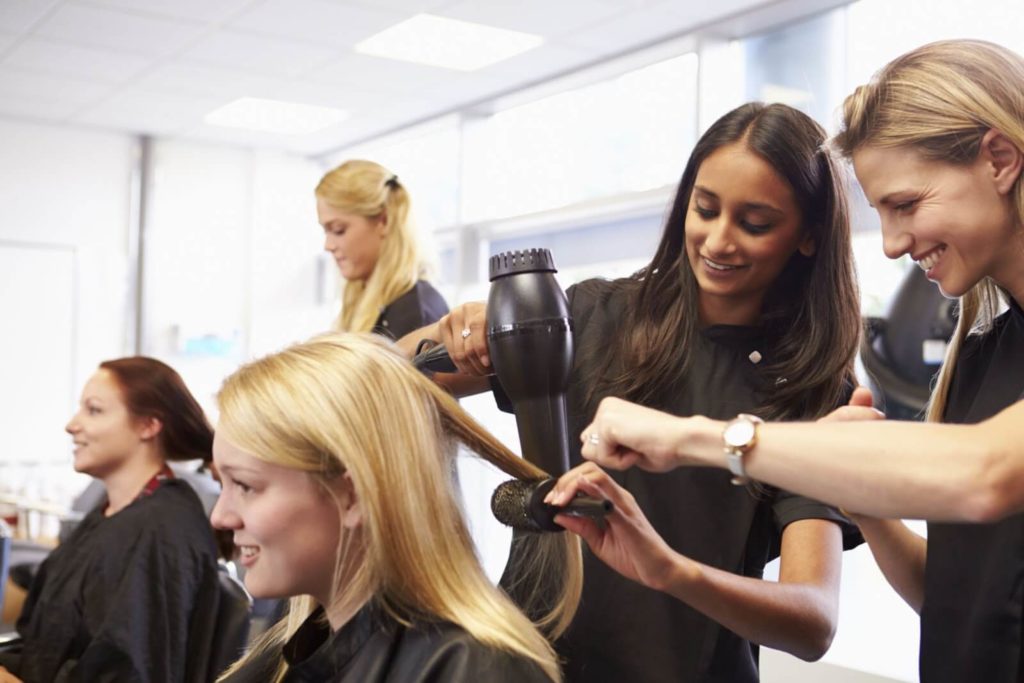
Thus, in the future, when you look for other opportunities as a hairdresser, this apprenticeship experience will come handy. In addition, your future employer will be aware that you already know a lot of things. Therefore, the skills required to be a hairdresser will already be instilled in you.
Additionally, your mentor will provide you with a certificate after you complete your apprenticeship under them. There are different levels of apprenticeships that will qualify you for different levels of NVQ qualifications. These include:
Moreover, each level of apprenticeship generally takes between 12 and 18 months to complete. It depends on your skill level and the speed of your progress. It also depends on how many hours you are doing the apprentice for each week. However, hairdressing apprenticeships are a minimum 30-hour per week. But, you have to keep in mind that a hairdresser has to work on weekends as well as on special occasions such as Easter or Christmas.
Intermediate Level Apprenticeship
Intermediate level apprenticeships are the stepping stone in your career in hairdressing. Apprenticeships would give you hands-on training and the opportunity to get full mentorship from a professional in this field.
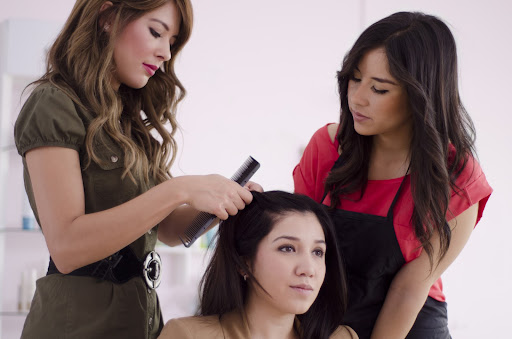
Some of the things that will be covered in this level of apprenticeship are:
Advanced Level Apprenticeship
Advanced level apprenticeships will take your hairdressing career to a whole new level. After completing an Advanced Hairdressing Apprenticeship, you will achieve NVQ Level 3. But, the Level 2 qualification is a prerequisite for the Level 3 qualification.
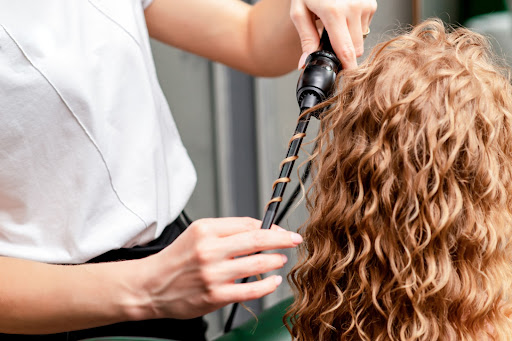
At the end of the Advanced Apprenticeships in Hairdressing, you will have all the necessary tools and experience to become a senior hairdresser. You could also get into any managerial role at any hair salon or even open your own salon!
Moreover, a list of some of the essential things that you will learn from this level of apprenticeship are:
After completing all the steps of training and apprenticeship as a hairdresser you can open up your own business. You have to register your hairdressing business to the local council to run a business legally and maintaining some other legal obligations as well.
Salary Expectations - Hairdresser
We have covered most of the hairdressing profession’s roles and responsibilities, skills required, and how to become a hairdresser. However, you must be curious by now about how much they earn regularly? This is what this segment is about. We will not give you a brief idea of how much you can make as a hairdresser.
To begin with, the average salary for a hairdresser is dependent on several factors, such as their experience level, educational qualifications and the number of hours they work. Also, if you are self-employed, your earnings depend on your number of clients per day and the costs associated with salon maintenance.
Thus, we have prepared a table for you to earn as a full-time hairdresser at different experience levels. This table will help you get an idea of how much you could make as a professional hairdresser.
Experience Level
Annual Pay (₤)
- Assistant/Junior Hairdresser
- Senior Hairdresser
- Highly Experienced Hairdresser
- ₤ (14000-15000)
- ₤ (18000- 22000)
- ₤ (25000-30000)
Closing Note
Hairdressing is a very promising profession. It allows you to move up the career ladder very quickly based on your skills and efficiency. The purpose of this article was to give you a comprehensive guide on this profession and help you understand how to become a hairdresser in the UK.
Thus, if you are interested in joining this field, you can speak to us about the available courses on hairdressing at Janets. Our experienced group of staff would be able to assist you with any enquiries regarding the courses available.
Read more blogs
- Why Every Employee Needs Data Analytics Skills in 2024
- Making the Most Out of Team Communication in 2024
- 10 Growth Marketing Strategies for 2024
- Christmas Cooking Guide: 10 Tips for Healthy Diet
- The Ultimate Guide to Healthy Diet During Holidays
- How to Become a Teaching Assistant with no Experience in the UK
- 10 Game-Changing Microsoft Office Hacks That You Must Know
- The Future of Work: How to Stay Relevant in a Changing Job Market
- The Ultimate Guide to Become A Care Worker in the UK
- Boost Your Brand with Ghostwritten Content: The Smart Business Move
- Mastering the Art of the Education-First Resume: Essential Tips and Strategies
- From Classroom to Career: The Transformative Power of Education on Job Prospects
- How To Write A Military Resume: A Complete Guide
- 10 Essential Soft Skills In 2023 and How to Develop Them
- 15 of the Best Remote Working Jobs to Pursue in 2023





 LOGIN/Sign up
LOGIN/Sign up
